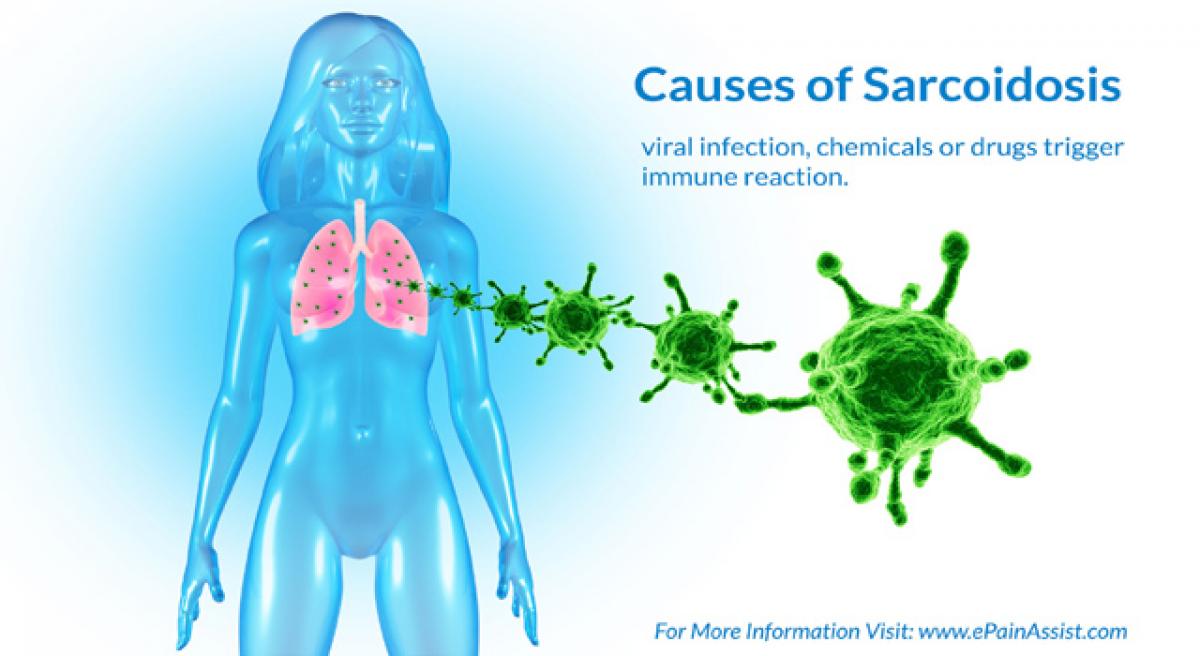Understanding Sarcoidosis

Sarcoidosis is the growth of tiny collections of inflammatory cells (granulomas) in different parts of your body — most commonly the lungs, lymph nodes, eyes and skin. Doctors believe sarcoidosis results from the body\'s immune system responding to an unknown substance, most likely something inhaled from the air.
Sarcoidosis is the growth of tiny collections of inflammatory cells (granulomas) in different parts of your body — most commonly the lungs, lymph nodes, eyes and skin.
Doctors believe sarcoidosis results from the body's immune system responding to an unknown substance, most likely something inhaled from the air.
There is no cure for sarcoidosis, but most people do very well with little or only modest treatment. In half of cases, sarcoidosis goes away on its own. In a few cases, however, sarcoidosis may last for years and may cause organ damage.
General symptoms
Many people with sarcoidosis have no symptoms, so the disease may be discovered only when you have a chest X-ray for another reason.
For many people, sarcoidosis begins with these symptoms: Fatigue, fever, swollen lymph nodes and weight loss. Many patients with sarcoidosis experience lung problems, which may include persistent dry cough, shortness of breath, wheezing and chest pain.
Some people who have sarcoidosis develop skin problems, which may include a rash of red or reddish-purple bumps, usually located on the shins or ankles, which may be warm and tender to the touch; disfiguring sores (lesions) on the nose, cheeks and ears; areas of skin that are darker or lighter in colour and growths under the skin (nodules), particularly around scars or tattoos.
Causes
Doctors don't know the exact cause of sarcoidosis. Some people appear to have a genetic predisposition to develop the disease, which may be triggered by bacteria, viruses, dust or chemicals. This triggers an overreaction of your immune system and immune cells begin to collect in a pattern of inflammation called granulomas. As granulomas build up in an organ, the function of that organ can be affected.
There's no cure for sarcoidosis, but in half of cases it goes away on its own. You may not even need treatment if you don't have significant signs and symptoms of the condition, but you should be monitored with regular chest X-rays and exams of the eyes, skin and any other organ involved.
Medications
If your symptoms are severe or organ function is threatened, you will likely be treated with medication.
- Corticosteroids: These powerful anti-inflammatory drugs are usually the first-line treatment for sarcoidosis.
- Medications that suppress the immune system: Medications like methotrexate (Trexall) and azathioprine (Azasan, Imuran) reduce inflammation by suppressing the immune system.
- Hydroxychloroquine: Hydroxychloroquine (Plaquenil) may be helpful for skin disease and elevated blood-calcium levels.
- Tumor necrosis factor-alpha (TNF-alpha) inhibitors: These medications are commonly used to treat the inflammation associated with rheumatoid arthritis.
Surgery
Organ transplant may be considered if sarcoidosis has severely damaged your lungs, heart or liver.
A team of physicians consisting of cardiologists, pulmonologists and rheumatologists are available in the Sarcoid Clinic to attend the patients and provide optimal treatment.
Patients of Sarcoidosis can utilise this opportunity by consulting the CARE Outpatient Center for the appointments on Phone: 1800 108 6666.
By: Dr.T.L.N.Swamy Sr.Consultant Pulmonology
(The writer is Consultant Pulmonologist CARE Hospitals, Banjara Hills in Hyderabad.)















